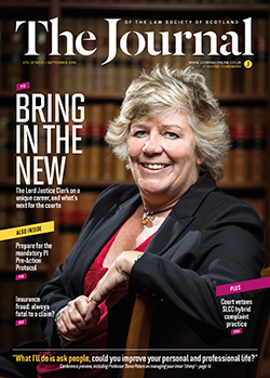Common property: what policy?
The Journal received the following letter on titles affected by the PMP Plus decision on common property, and, as requested, sought a response from Registers of Scotland. Both are reproduced in full here.
Common property: what policy?
In 2013 the Keeper of the Registers of Scotland promised updated guidance to deal with the thorny issue of transferring titles that contained a share of common property.
That guidance has now appeared, buried in the Keeper’s online legal manual (shortcut link:
bit.ly/2bVaVVQ) – and it seems to confirm what we have long suspected: there is no cure for common property ills.
Our reading of this is that the Keeper will “clean” the Register of PMP-affected titles as titles are transferred, rather than leaving it to conveyancers to consider ownership. This clearly has many serious implications for owners in the affected housing estates, retail parks and industrial estates etc, where the common areas cannot be mapped, and for solicitors reviewing, reporting on and certifying the titles. Tenements are not affected.
The Keeper’s view is presumably that she is simply reflecting the law and this is merely an update. Not so. Her policy has changed. Instead of leaving the words on the page to be interpreted one way or another, it seems they will be removed.
With such serious consequences for many people, we might have expected more clarity, transparency and consultation from the Keeper. Has legislation been considered to rectify the position?
We ask the Keeper to provide an update to explain her policy and the practical implications of it for conveyancers for future transactions.
Registers of Scotland reply:
The authors suggest that the Keeper is identifying and then proactively removing rights in common in title sheets created prior to the designated day under the 2012 Act. This is not the case. Her published policy is set out at www.ros.gov.uk under “Mapping Common Areas”.
This guidance explains that the Keeper will omit purported rights in common from new title sheets created following an application for first registration or a transfer of part, where the application does not contain information permitting the common area to be mapped on the cadastral map. It also confirms that rectification of the Land Register may be possible if the registered proprietor provides appropriate mapping information. Applicants whose purported rights have been omitted are directed to this guidance by a letter issued on completion of registration.
The 2012 Act requires that the cadastral map must disclose the boundaries of each plot of land entered in the Land Register. This reflects the Scottish Law Commission’s vision of a modern register which identifies not only who has what rights, but also contains clear information about the land those rights relate to. Entering purported rights of ownership in land in title sheets where the relevant land is not identified on the cadastral map would significantly undermine that vision and cause confusion as to the status of the rights, and more importantly would be incompatible with the duties which the Parliament has imposed on the Keeper in the 2012 Act.
Title sheets which include rights of ownership that the Lands Tribunal determined to be ineffective in the PMP Plus and Lundin Homes cases are inaccurate. Under the 2012 Act, the Keeper is of course bound to remove inaccuracies in the Land Register when their existence is identified, thus reflecting the true legal position. Those inaccuracies do not result from the changes in land registration law embodied in the 2012 Act.
In this issue
- Beyond the named person service
- Sexual harassment: an everyday problem
- Governing Scotland in a federal United Kingdom
- Losing our judgment? (1)
- Reading for pleasure
- Opinion: Alison Reid
- Book reviews
- Profile
- President's column
- The future, step by step
- People on the move
- Changing face of the courts
- Success: the chimp factor
- Courts reform: a call to pre-action
- Teeth that could be sharper
- Good claims, bad lies
- Unlocking doors: demystifying squatting
- Back to basics
- Brexit and IP: what should solicitors be doing now?
- Agency, insolvency and termination
- Brexit and the agricultural sector
- A carnival for some, but not for others
- Scottish Solicitors' Discipline Tribunal
- Culling of the hybrids
- Common property: what policy?
- Cause of action
- Client balances: reminder issued
- Law reform roundup
- From the Brussels office
- Paralegal pointers
- Your Law Society of Scotland Council Members
- At the doors of the court
- Ask Ash
- To the focused, the medals
- Losing our judgment?
- MacKenzie boosts Society's AML drive






